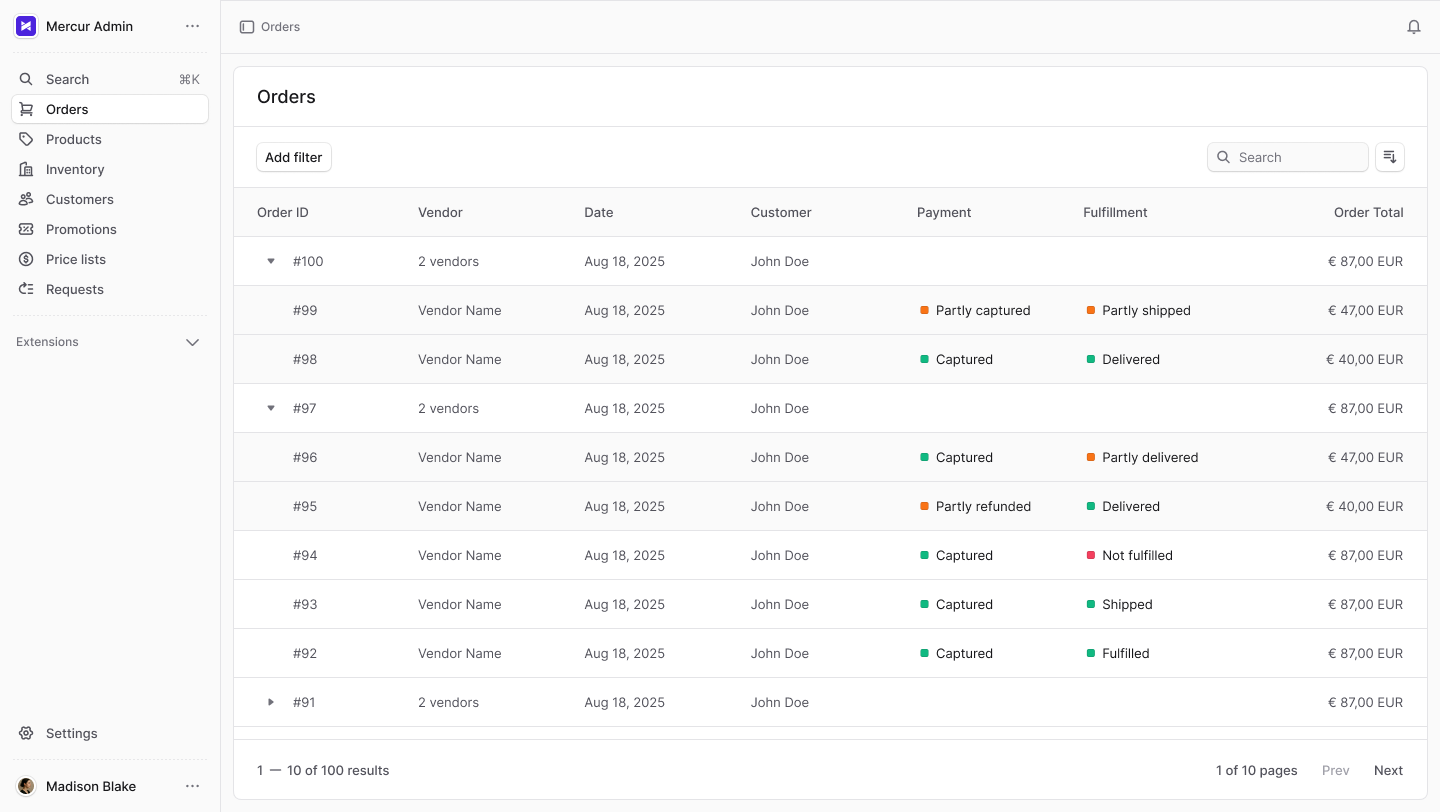Order Management
Manage the full order lifecycle - from checkout to fulfillment, returns, and refunds - with a headless order engine built on Medusa and extended for marketplaces in Mercur. Mercur’s Order module is where every order from every channel ends up. It gives your team a complete view of what was ordered, how it was paid for, where it’s shipping from, how it’s being fulfilled, and how returns or refunds are handled.
How do you manage orders in Mercur
Give your operations, support, and finance teams one place to work with orders, instead of jumping between multiple tools.
With the Order module, you can:
- View and manage orders coming from any storefront or sales channel in one unified list.
- Track order status in real time: payment, fulfillment, shipment, returns, and refunds.
- Handle payments end-to-end: captures, partial captures, voids, and refunds.
- Orchestrate fulfillments and shipments across multiple warehouses and vendors.
- Process returns, exchanges, swaps, and claims using structured Medusa flows.
- Apply and audit discounts, gift cards, taxes, and adjustments at the order or line level.
- Support multi-vendor and split orders in marketplace scenarios, with clear separation per seller.

Order Management
video overview

Build custom marketplace with Mercur
Create your unique multi-vendor platform with our powerful, flexible marketplace solution that adapts to your business needs.
What the Order module delivers for your business
Single view of every order
All orders from all channels and vendors are tracked in one place, with a full timeline of events. Support and operations teams always know what’s happening and what needs to happen next.
Full lifecycle in one domain
From cart conversion and payment, through fulfillment and shipping, all the way to returns, exchanges, and refunds—everything is handled by the same order engine, not scattered across plugins.
Marketplace-ready order flows
Split customer orders by vendor, location, or fulfillment method. Each vendor sees only their part; you keep a consolidated view for settlement, SLA tracking, and support.
Fewer manual corrections and edge cases
Medusa’s typed entities for refunds, adjustments, claims, and swaps mean you correct orders using standard flows—not ad-hoc database fixes or one-off business rules.
API-first orchestration for your stack
Because orders are fully exposed via APIs, you can plug in PSPs, WMS, ERP, invoicing, tax engines, or 3PLs and keep one consistent “source of truth” for all order-related data.
Medusa-compatibility
Everything is compatible with the Medusa platform.
Core capabilities
1. Order data model & lifecycle
A modern, headless order model built on Medusa and extended in Mercur:
- Each order stores line items, customer data, billing and shipping addresses, totals, currency, and metadata.
- Clear status progression from cart → order → payment → fulfillment → completed, with support for cancellations and partial flows.
- A full activity timeline for each order: when it was created, paid, fulfilled, refunded, updated, and by whom.
- Order metadata lets you attach custom information (internal references, external IDs, business rules) without breaking the schema.
2. Payments & captures
Work with payments directly from the order, regardless of which provider you use:
- Orders are linked to one or more payment sessions created during checkout.
- Support for authorized, captured, partially captured, and cancelled payments.
- Trigger full or partial captures once you’re ready to ship or meet your internal rules.
- Issue full or partial refunds directly from the order for returns, claims, or goodwill.
3. Fulfillment & shipping
Connect orders to real-world logistics:
- Orders can be fulfilled in one or multiple shipments, depending on stock locations and vendors.
- Create fulfillments for subsets of items (e.g., some items shipping now, others later).
- Attach tracking numbers, carrier information, and shipping status updates to each fulfillment.
- Fulfillments integrate with Inventory: stock is reserved and later deducted when items ship.
4. Returns, swaps & claims
Handle post-purchase experiences in a structured way:
- Returns: Create return requests, generate return labels, and register incoming items.
- Swaps/exchanges: Replace items within a single flow: return the original products and ship replacements.
- Claims: Register claims for damaged, missing, or incorrect items and decide whether to refund, re-ship, or replace.
5. Discounts, gift cards & taxes
Consistent commercial logic for every order:
- Apply discount codes at the order or line level, including percentage, fixed amount, and free shipping.
- Issue and redeem gift cards and store credits, fully integrated into the order totals.
- Calculate taxes per region and customer type using Medusa’s built-in tax calculations or external services.
- Use line item adjustments for precise corrections without hacking totals.
6. Multi-channel & marketplace orders
Designed for multi-channel and multi-vendor realities:
- Orders can originate from multiple channels (DTC storefront, B2B portal, marketplace frontends) and are stored in one domain.
- Split orders per vendor: a single customer checkout can produce separate vendor-specific subflows.
- Each vendor sees only their own line items and fulfillments, while the operator has a global view.
- Hooks and metadata support implementing commission models and settlement logic.

Build custom marketplace with Mercur
Schedule a guided tour of Mercur Marketplace tailored to your specific marketplace requirements. Connect with our team to discuss how we can help bring your marketplace vision to life.
